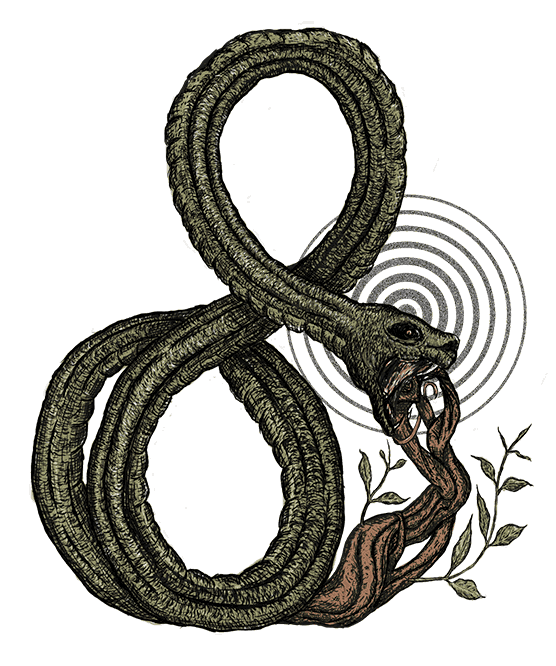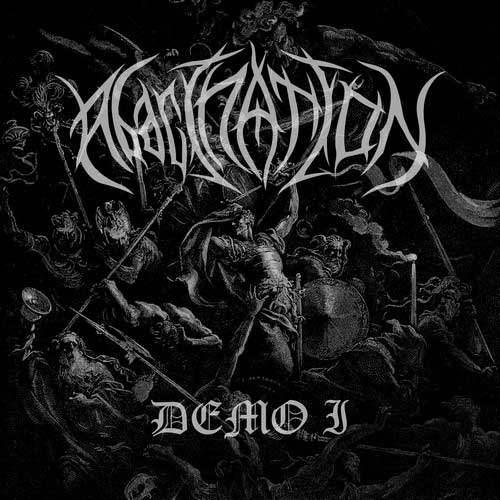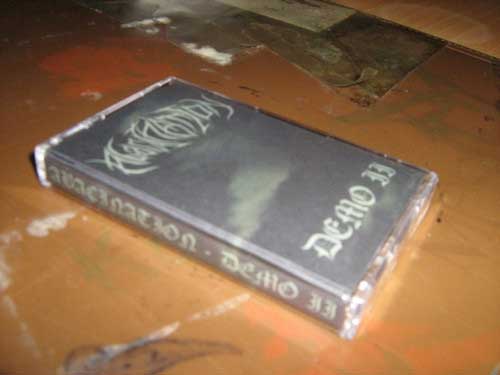Misþyrming I
2024-06-05
by Niklas Göransson
Songs of Fire and Chaos – after Abacination ended in 2013, D.G. founded Icelandic black metal band Misþyrming. Their rapid ascent to prominence culminated in the creation of Söngvar elds og óreiðu.

DAGUR: Music has always held a huge place in my life. One thing I am eternally grateful for is that my mother made me actually play, as opposed to just listen. She opened my eyes to the perspective of a performer, and this happened at such a young age that it became an intrinsic part of my upbringing.
Dagur’s mother, a lifelong music enthusiast, had him taking piano lessons when he was six. Two years later, in 2001, he started playing guitar.
DAGUR: Like many of my peers in metal, I picked up the guitar on my own – but having already been classically trained made it easier to understand the flow of music. I knew what lies behind the scale, such as the number of notes contained in an octave; this was an invaluable privilege that I’m aware most other musicians never had.
The same year, at age eight, Dagur discovered RAMMSTEIN – the German industrial metal band that became huge in the early 2000s.
DAGUR: The very instant I heard “Mutter”, I knew precisely what I wanted to do with my life. Soon after, I saw RAMMSTEIN’s Live aus Berlin DVD – in my opinion, still the best concert footage ever. I think I admired their guitarists the most; watching them gave me a fantasy of being on stage myself. It looked fucking cool, and I wanted to do something cool.
Was it the crowd adulation you found appealing?
DAGUR: No, glory and validation had nothing to do with it. I know the RAMMSTEIN guys have become extremely self-absorbed and arrogant about their own greatness. Everywhere they go, people worship them like gods – and I’ve never been interested in that. But playing metal, rocking out hard and loud on a big stage with good lights and a full production… you know, to be alive on this earth is a rare opportunity, and this is what I chose to dedicate my life to.
Are you still into RAMMSTEIN today?
DAGUR: Absolutely. About half of their music is garbage, but the good stuff hits hard. However, there are few people in this world I loathe more than RAMMSTEIN fans; they are so fucking stupid and dogmatic. I’ve been booted from several forums just for arguing with them. You can’t bring up any criticism – no one is allowed to question anything. And if I tell people that I’m into RAMMSTEIN, I’d be embarrassed if they put me in the same category as those nutheads.
Dagur took the next step in his musical development at age twelve, in 2004, when he began singing in a boys’ choir.
DAGUR: We rehearsed in a church, of all places. I didn’t really mind, but I wasn’t too passionate about it either. I hated a lot of the songs – especially the religious hymns. Still, it became a crucial learning experience. I also wanted to play the drums, but that was impossible with my living situation. We had no space for a kit, so there weren’t many opportunities to practise.
Dagur decided to learn not only how music is performed but also produced. Without an analogue kit or the equipment to record one, he had to rely on programming the drums.
DAGUR: It’s been an ongoing learning process for the past seventeen years. The way I see it, drums are the song’s foundation – especially in rock and pop music. They provide a backbone: its structure, or the framework. Everything else is meat on the bones. Of course, other instruments can contribute to the rhythm, and it’s possible to make rhythmic music without percussion. But in general, the remaining instruments add flavour and texture while drums keep everything grounded and moving forward.
The following year, in 2005, Dagur formed his first band.
DAGUR: That’s hardly worthy of mention since we never wrote any original material. We just down-tuned our guitars and played “Smoke on the Water” in a heavy, brutal style. I’m no big DEEP PURPLE fan, but it was good to get some jamming experience. I also covered THE BEATLES, as well as MUSE and BLUR, despite not really being into either band. I don’t mean to shit on any of them, but they were quite far from my interests.
By this stage, at age thirteen, Dagur had become a devout METALLICA fan. He persuaded a few friends to form a cover band – and with Dagur on drums, they performed live at a school event.
DAGUR: We kept it simple with tracks like “For Whom the Bell Tolls”, and that’s when I truly discovered my place in this world; not just being in a band but playing fucking metal. That’s where I feel most at home. Since then, I’ve done everything I can to express myself through various instruments – whether solo or with others, in rehearsal spaces, during studio recordings, or on stage. This is where I belong.
In 2008, at fifteen, Dagur discovered extreme metal, starting with BEHEMOTH. Meanwhile, Iceland experienced the largest systemic banking collapse in the history of modern economics.
DAGUR: I was at the peak of my teen angst, so the financial situation seemed irrelevant to me. Like, ‘Oh, the banks are suffering? Who cares? Fuck the system.’ I actually find the concept of teen angst amusing because it allows you to be completely self-absorbed. That’s how we got incredible music, such as early BURZUM. It’s a time before you understand responsibility and start maturing; you’re just being radical and breaking shit. That’s the mindset I had when our economy collapsed. I was drunk driving with my friends, throwing glass bottles at bus stops, and just not giving a fuck.
After starting upper secondary school in 2010, Dagur joined a more professional choir than the one he’d sung with five years earlier.
DAGUR: It was a phenomenal opportunity. We performed with the Icelandic Symphony Orchestra and even sang pieces composed specifically for us by respected artists. The choir conductor is the most arrogant person I’ve ever met – except for Tom G Warrior – and I really hated her. However, this lady deserves credit because she landed us several prestigious gigs and brought a serious mood to everything. I still draw inspiration from that experience when writing my own music.
Naturally, Dagur’s foray into the darker forms of music eventually led him to black metal. One of the first albums to completely captivate him was DEATHSPELL OMEGA’s 2010 release, “Paracletus”.
DAGUR: That was a turning point, similar to the first time I heard RAMMSTEIN. Initially, I didn’t understand anything, but the sound textures were so rich and majestic that I felt compelled to decipher them. So, I listened to “Paracletus” over and over again, enjoying it while also studying the music – paying close attention to every detail, such as the tempo changes and weird drum fills.
While many key elements of “Paracletus” – such as peculiar time signatures, dissonant chord progressions, and unpredictable shifts in tempo and dynamics – are commonplace in black metal today, they were essentially uncharted territory back in 2010.
DAGUR: I wanted to learn the entire record by heart – to be able to air drum all the way through. When I finally mastered it, I entered a new level of enjoyment where I could anticipate what was coming and still love every moment. This is an impressive feat in music. Pop songs, in particular, are often so predictable that they quickly become boring. My favourite records always offer new discoveries, even after countless listens. Sometimes, I focus on the drums or the vocals, but I usually don’t read the lyrics until I’ve familiarised myself with the music.
How come?
DAGUR: To me, studying lyrics is like diving into a totally different perspective – one that reveals the composer’s underlying intentions. This aspect often remains hidden when you first experience the music, so I prefer to process them separately. It allows me to truly understand and appreciate what the artist was trying to convey.
Discovering DEATHSPELL OMEGA and then digging deeper into black metal reignited Dagur’s zeal to join a proper band. Initially, he tried to get something going with an older acquaintance.
DAGUR: When he asked about my gear, I told him I owned a good guitar but not a proper amp. I was informed that he had no use for me unless I could bring a big amplifier capable of matching the loudness of a drum kit. This became almost like a revelation – I understood that I needed to take my music more seriously.
After obtaining an amp, Dagur felt confident enough to form his first serious metal band. Around the same time, he came across a post on an Icelandic forum by a drummer looking for someone to play with.
DAGUR: He told me that his old project – coincidentally, MISÞYRMING bassist Gústaf’s first death metal band – used to cover “Born Dead” by DEATH, which is an awesome song. We started jamming it, and the chemistry between us felt natural. After trying out two of his own tracks, which also sounded good, we decided to advertise for other members.
Dagur and the drummer – Sigurður Jakobsson – brought in a singer, a bass player, and a second guitarist, which became the birth of ABACINATION.
DAGUR: That’s when I really got into writing material meant to be performed in a band setting. It ended up being an interesting combination of guys, and we’re all still doing music – but separately.
Today, three of the co-founders of ABACINATION – the aforementioned drummer, vocalist Örlygur Sigurðarson, and bassist Illugi Kristinsson – are in a black metal band called MANNVEIRA. Örlygur also sings in NAÐRA, Illugi has a solo project called KVIÐRISTA, and Sigurður is in ÚLFÚÐ. The second guitarist, Magni Freyr Þórisson, plays with AETERNA.
In March 2011, after a few months in the rehearsal place, ABACINATION recorded “Demo I” and began considering stage performances.
DAGUR: When a band starts playing live, they need to find bigger acts to open for. Of course, you could try to headline your own show – at significant risk of no one turning up. Initially, we tried getting some of the older bands to play with us but didn’t receive much feedback. However, we kept at it and gradually made progress.
In December of that year, ABACINATION performed at a small Reykjavík gathering called Andkristnihátíð, which translates to ‘Anti-Christian Festival’.
DAGUR: Andkristni was created in 2000 by members of SÓLSTAFIR. It started as a protest against some government-funded Christian festival and eventually became an annual event held each winter solstice. It was our first time playing at a respectable gig. SVARTIDAUÐI and several other revered bands – though I’m not sure it’s relevant to mention them now – performed there. Andkristni became a watershed moment for ABACINATION; it felt as if we were finally becoming a part of the local scene.
The print-exclusive MISÞYRMING interview in Bardo Methodology #8 features an extensive discussion about Dagur’s involvement in the burgeoning Icelandic black metal scene.
Around this time, Dagur got to know Tómas Ísdal, who was two years older and already deeply involved in the local scene. In 2012 – the same year ABACINATION’s second demo came out – Dagur and Tómas recorded “Null & Void” with their new doom-inspired black metal band, NÚLL. All drums and guitars were recorded in one eventful week, during which law enforcement raided the rehearsal space.
DAGUR: They came for a noise complaint and then started accusing us of being on drugs. We were all super stoned and didn’t know what to say. Luckily, we’d smoked all the weed already, so they couldn’t find anything. One of them noticed a crooked spoon on the table and asked, ‘Were you doing drugs with this?’ <laughs> Like, ‘No, are you stupid?’ It was a chaotic recording process, but it all made sense. We had no deadlines, no label, and no purpose other than making music.
After several months of clashes over their musical direction, Dagur began feeling that his time with ABACINATION was coming to an end. The band’s final show took place at Wacken Metal Battle Iceland in April 2013.
DAGUR: Wacken has never been a goal of mine, but this ‘battle’ presented an opportunity for bands to be noticed. In the early stages, you need all the exposure you can get – especially if your music is mediocre. People aren’t paying attention when you play live; they’re like, ‘Yeah, it’s just a local band.’ That was our sense of things; ABACINATION seemed to be going nowhere. I felt dead inside even before the competition, but we thought it might be worth a try.
To speculate for a moment – if ABACINATION had been victorious, do you think your band trajectory would’ve changed?
DAGUR: I have no idea. I can’t imagine what would’ve happened if we’d won and gone on to perform at Wacken – it’s a hypothetical question that’s impossible to answer definitively. Presumably, we would’ve kept writing songs and enduring endless arguments over how many times to play each riff.
Did ABACINATION play any MISÞYRMING songs?
DAGUR: Yes, “…af þjáningu og þrá” and “Endalokasálmar”. I wasn’t the vocalist for ABACINATION, so Örlygur did his thing, which I thought sounded pretty good. However, performing these songs in a controlled setting where nobody could interfere felt much more aligned with my vision.
Then, Dagur wrote “Söngur heiftar” – and this piece marked a significant milestone in his evolution as a black metal composer.
DAGUR: Like, ‘Yes! Now I can make seriously aggressive, catchy, and melodic black metal. This is the direction I wanna take things in.’ We rehearsed it a few times, but the vibe wasn’t quite right. Our drummer described the song as ‘amphetamine steroids’ – which became its working title – because it was so excessive and explosive, far more than anything we’d done previously. I remember asking, ‘Are you really questioning the aggression?’ That was the final straw for me; clearly, we were on totally different levels.
These irreconcilable musical differences led to the dissolution of ABACINATION – and the subsequent start of MISÞYRMING.
DAGUR: Splitting up ABACINATION felt like the right decision; there were simply too many conflicting ideologies. With MISÞYRMING, I could fully focus on my own convictions. At that time, I was into several studio-only bands like DEATHSPELL OMEGA and BLUT AUS NORD. The latter’s use of programmed drums probably influenced my consideration of using a drum machine for MISÞYRMING. But when I mentioned this to Tómas, he said, ‘Fuck no!’
log in to keep reading
The second half of this article is reserved for subscribers of the Bardo Methodology online archive. To keep reading, sign up or log in below.










